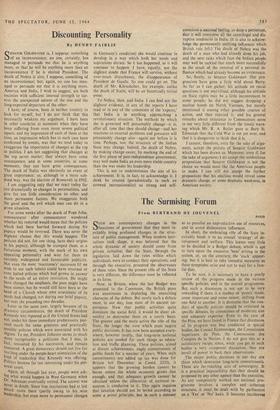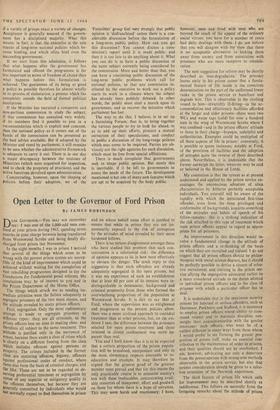The Surmising Forum
From BERTRAND DE JOUVENEL
PARIS
C mu are contemporary changes in the a functions of government that they must in- evitably bring profound changes in the struc- ture of public management. When modern insti- tutions took shape, it was believed that the whole dynamic of society should come from private initiative; that the State, through the legislative, laid down the rules within which individuals were to conduct their operations, and through the executive, procured the observance of these rules. Since the present role of the State
very different, the difference must be reflected in its form.
Now, in Britain, when the last Budget was presented to the Commons, the British press was unanimous in deploring the unexciting character of the debate. But surely such a debate must, in our day, lose most of its ancient im- portance. Now that public activities quite dominate the social field, it would be sheer ab- surdity to determine them on a yearly basis. The greater and the more active the role of the State, the longer the view which must inspire public decisions. It has now been accepted every- where, however tardily, that long-term national policies are needed for such things as educa- tion and traffic planning. These policies, aimed at distant achievements, imply commitments of public funds for a number of years. When such commitments are added up (as was done for Britain last December in Cmnd. 2235), it appears that the growing burden cannot be borne unless the whole economy grows fast enough, and that adequate growth cannot be obtained unless the allocation of national re- sources is conducive to it. This again requires that taxation should not be levied according to some a priori principle, but in such a manner
as to penalise an unproductive use of resources, and to avoid disincentive influences.
In short, the embracing role of the State in- evitably binds it to an overall 'strategy' of de- velopment and welfare. This leaves very little to be decided in a Budget debate, which is apt to turn upon the excessive 'heat' arising in the system, or, on the contrary, the 'slack' appear- ing; but it is best to take remedial measures as these symptoms arise and not to wait for a fate- ful date.
To be sure, it is 'necessary to have a yearly review of the progress made in the various specific policies, and in the overall programme. But such a discussion is not apt to be very rewarding if there is a medley of 'points' made, some important and some minor, shifting frorri one field to another. It is desirable that the con- duct of specific policies should be criticised in specific debates, by committees of moderate size and adequate expertise. Even in the case of the Plan, we have found in France that discussion of its progress was best conducted in special bodies, the Conseil Economique, the Commission Superieure du Plan, the Commission des Comptes de la Nation. I do not give this as a satisfactory recipe, since, while you get in such bodies a very competent discussion, they are bereft of power to back their observations.
The major public decisions in our day are those which determine long-term commitments. These are far-reaching acts of sovereignty. It is a practical impossibility that they should be proposed by any other agency than the executive. As any competently worked out national pro- gramme involves a complex and coherent' structure, it must be dealt with by parliament on a 'Yes' or `No' basis. It becomes incoherent if a variety of groups exact a variety of changes. Acceptance is generally assured if the govern- ment has a disciplined majority. What this means, in fact, is that the executive is the sole master of long-term national policies which be- come binding, and which often bind even the succeeding government.
If we start from this admission, it follows that what happens after the government has formulated and offered the programme is far less important in terms of freedom of choice than what happens before this formulation is achieved. The guarantees of its being as good a policy as possible therefore lie almost wholly in its process of elaboration, a process which lies completely outside the field of formal political institutions.
If the Minister has recruited a competent and non-partisan commission to study the subject, if that commission has consulted very widely, if its members find it possible to join in a recommendation which is explicit and concrete, then the national policy as it comes out of the hands of the commission can be presented as the best advice available. But if adopted by the Minister and voted by parliament, it still remains to be seen whether the administrative framework is adequate to carry it out. There is in our day a major discrepancy between the routines of Ministries (which were organised for inspection, and to check the propriety of practices), and the active functions devolved upon administration.
Concentrating, however, upon the shaping of Policies before their adoption, we of the
'Futuribles' group feel very strongly that public opinion is 'disfranchised' unless there is a con- siderable discussion before the formulation of a long-term public policy. How can you get this discussion? You cannot discuss a com- mission's report until it is made public, and then it is too late to do anything about it. What you can do is to have a public discussion of the same subject currently being considered by the commission. More and better than that, you can have a continuing public discussion of the long-term public problems which call for national policies, so that any commission in- stituted by the executive to work out a policy starts its work in a climate where the subject , has already been publicly debated. In other words, the public must steal a march upon its government, and so recover the initiative which parliament has lost.
The way to do this, I believe, is to set up a Surmising Forum; that is, to bring together the various people to try to look far ahead, so as to add up their efforts, procure a mutual correction of their speculations, and conduct in public a discussion of the long-range policies which may come to be required. Parties are ob- viously not the right agencies for such disctission, which must be free from special affiliations.
There is much complaint that governments seek to shape public opinion. But surely this is inevitable, if it be left to governments to assess the needs of the future. The development mentioned is but one of many new features which are apt to be acquired by the body politic.



































 Previous page
Previous page